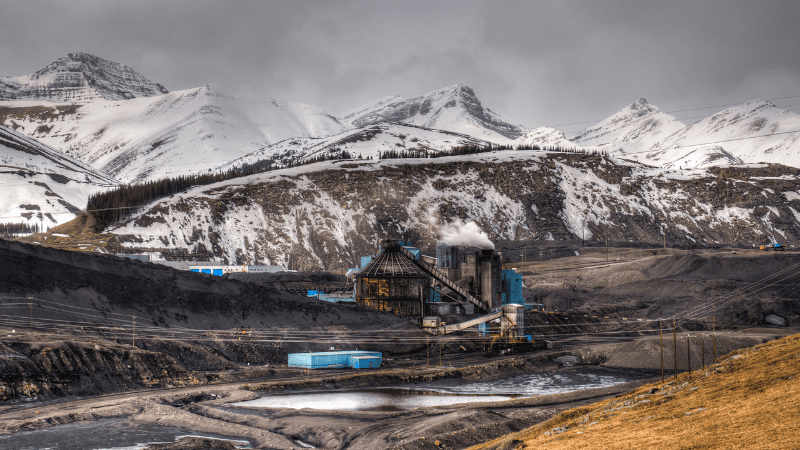By Joseph Bouchard, March 14, 2024
After more than a decade of aggressive efforts and development, China now stands tall as the largest mining producer and financier in the world, by some margin. It is the leading miner of 29 commodities including aluminum, coal, gold, magnesium, tin, phosphate, nitrogen, zinc, graphite, tungsten, rare earths, and other critical minerals.
Canada, which used to be a leading force despite its small demographic size and investment pool, is now at the bottom end of the global top 10 mineral producers. Still, China is looking to capitalize on the extent of Canada’s mining network nationally and around the world to advance its interests. With Canadian mining companies desperate for cash and the Canadian government showing little interest in financing a mining boost (especially in comparison to China), the People’s Republic is taking advantage of its leadership position to push it even further. Even with the recent Investment Canada Act (ICA) and the Canadian Critical Minerals Strategy, China has made Canada’s efforts look small by comparison.
As part of Canadian government’s aim to reduce Chinese economic influence in Canada, it made statements relating to the ICA’s application to this context in late 2023. The act gives the government the ability to review and reject foreign investments to ensure that they are beneficial to the Canadian economy and society, while promoting “positive foreign investment.” The national security component of the ICA could be used to reject Chinese mining investment in Canada.
The ICA is complemented by the recent Critical Minerals Strategy, which aims to decouple Canada’s mining supply chains from China and other adversaries, while stimulating the Canadian and allied critical mineral sectors. In line with these strategies, Canada ordered three Chinese firms – two of which are based in Hong Kong – to divest from their Canadian mining investments in November 2022.
However, early this year, Zijin Mining bought a 15 percent stake in Canadian-owned Solaris, testing the extent of the ICA and Critical Minerals Strategy. Most recently, Chengdu-based Shenghe Resources acquired a stake in Australian company Vital Metals, which owns a rare earths mine in the Northwest Territories, a deal that included buying the mine’s entire rare earths stockpile. China’s Sinomine Resource Group also purchased one of Canada’s only two lithium mines in Manitoba in 2019, a move that was left unchallenged.
Jiangxi Copper, one of the largest Chinese state-owned mining companies, also took over a majority stake in First Quantum Minerals in November 2023, which up until recently operated a copper mine worth over 5 percent of Panama’s total gross domestic product, as well as other large mines in Latin America, Africa, and elsewhere.
China, through the state-run China Investment Corporation, also has the largest shareholder position in Teck Resources and Ivanhoe Mines, both based in Vancouver.
The ICA has yet to put a dent in these investments.
These strategies will not truly work until there is a serious effort to bring domestic and allied capital into the Canadian mining sector, which desperately needs it. The Canadian government and mining companies are stuck in a difficult position – while they may not agree with China’s ideological or geopolitical posture, China is the global leader in the mining sector, and has the energy and money to sustain it. Minister of Natural Resources Jonathan Wilkinson even went so far as to say that “of course Canada will continue to have trade with China, some of that may involve trade in critical minerals.”
China has developed a prominent role as financier in the country, arguably since Xi Jinping’s rise to power in 2012. There were smaller acquisitions and investments before 2012, but it spiked in 2012 and onward. Since then, China has been the world’s most aggressive financier of mining, having invested $1.3-trillion in over 20,000 projects in 165 middle- and low-income countries. The first instance of Chinese mining investment in Canada was in February 2012 with Cameco, which received unspecified but “considerable” Chinese investment before seeing record earnings in the first quarter of the same year. Later in September, Canada signed a Foreign Investment Promotion and Protection Agreement (FIPA) with China, which could boost mining investment from China into Canada.
In 2016, a report from the CBC outlined that Canada was making “too-rosy investment pitches” to China in the mining sector, with Canada misrepresenting its mining sector to entice investment from China. Now, China has links to more than two dozen Canadian mining companies with stakes in critical minerals.
As a result, Canada is now part of China’s push into the Western world, where it is trying to push its interests and values into the fore. Investors in Beijing, Shanghai, and Hong Kong are happy to fuel the government’s mining push — particularly in Canada. With a growing need for capital and faced with few alternatives, Canadian mining companies are accepting Chinese financing and investment to sustain their operations.
Given Canada’s need for capital, China is in a position to benefit from Canada’s established mining infrastructure and longstanding expertise in the mining field. China has been throwing billions of dollars in mining around the world to project its own power and increase its stake in the burgeoning sector.
While the global demand for critical minerals is ramping up, many Canadian mining companies — and the Canadian government along with it — have been unable to meet that demand. Companies, especially smaller and medium-sized companies, are barely profitable and face difficulties attracting investment. Mining, in an increasingly unpredictable geopolitical environment and one where anti-mining protests are so common and disruptive, is a risky and costly business. Still, mining, especially in critical minerals, is immensely important to Canada’s economic, energy, geopolitical, and security interests.
The world will need to radically increase its mining output just to maintain — nevermind increase — its population and living standards. That will require substantial capital. Investors are understandably hesitant to invest in such a volatile sector. China, however, with its nearly unlimited cash and ambitious elite class, is happy to fill the gap. In the first half of 2023, China’s metals and mining investment reached $10 billion, a 131 percent increase from 2022, with China’s Rare Earth Elements (REE) mining sector being responsible for 60 percent of all production. Last year, Chinese metals and mining investment hit $19.4 billion, a new record.
Generally, China accounted for about 28 percent of all mining output in 2020, with that share only increasing. China is the world’s largest producer of electric vehicles, batteries, solar panels, and wind turbines, and its mining power is helping sustain this production.
Apart from this China-dependence, Canada has few alternatives. Despite the passing of the Inflation Reduction Act in the U.S., and critical mineral funding opportunities from the Department of Energy and Department of Defence, investment is not flowing at the levels needed to move the dial. The Biden administration has implemented programs such as the China and Transformational Export Program (CTEP) through the US Export-Import Bank to stem the bleeding, but China retains its comparative advantage in this sector and a lack of private investment from the West is conspiring against a meaningful disruption to its pole position.
There are still a few policy alternatives Canada and its allies haven’t tried. Promoting domestic investment through public economic measures could help increase the flow of capital into Canadian mining. Options could include the federal government encouraging stock buy-backs, or providing cheap loans for mining investors, like the Inflation Reduction Act does for the US, or establishing strategic reserves of critical minerals similar to the petroleum reserves organized through the International Energy Agency.
It would also be helpful to make the regulatory process around mining – which on average takes years if not decades to complete – swifter, cheaper, and easier to navigate. Doing so would make investments less risky as well, given the shorter time horizons they would require before the start of operations, which sometimes can mean fluctuating commodity prices (and with that, fluctuating profit).
Encouraging other, less damaging foreign actors, like the US or Australia, to invest in Canadian mining is also another considerable option. If Canada could negotiate some kind of mining agreement or investment deal beyond existing free trade agreements, it could boost bilateral mining cooperation. Lowering the regulatory bar of entry for foreign investment from allied nations like the US and Australia would be a significant help. Canadian mining executives themselves are asking for it.
Both the US and Australia have already expressed concerns over China’s dominance in the mining and critical minerals sectors, and pushed back against Chinese acquisition of Western mining operations. Yet, the lack of foreign capital from outside China has made the shift difficult, and other countries will need to step up if they want a larger role in the future of the mining sector – especially with global demand for critical minerals expected to increase. This kind of public backing and multilateral cooperation could just be the key to increasing energy independence.
Joseph Bouchard is a freelance journalist covering geopolitics in the Americas, with reporting experience in Bolivia, Colombia, and Brazil. His articles have appeared in The Diplomat, Mongabay, Le Devoir, Responsible Statecraft, The National Interest, and Brazilian Report. He is a contributor with Young Voices.






